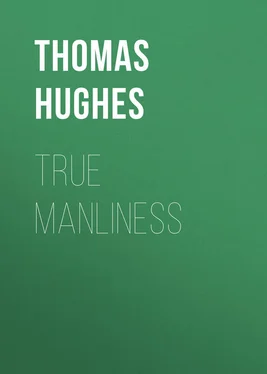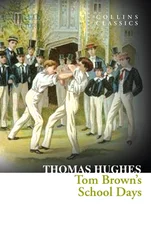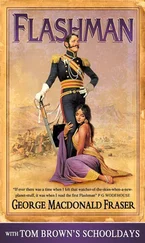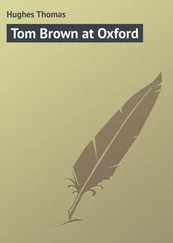Thomas Hughes - True Manliness
Здесь есть возможность читать онлайн «Thomas Hughes - True Manliness» — ознакомительный отрывок электронной книги совершенно бесплатно, а после прочтения отрывка купить полную версию. В некоторых случаях можно слушать аудио, скачать через торрент в формате fb2 и присутствует краткое содержание. ISBN: , Жанр: foreign_prose, на английском языке. Описание произведения, (предисловие) а так же отзывы посетителей доступны на портале библиотеки ЛибКат.
- Название:True Manliness
- Автор:
- Жанр:
- Год:неизвестен
- ISBN:http://www.gutenberg.org/ebooks/52534
- Рейтинг книги:5 / 5. Голосов: 1
-
Избранное:Добавить в избранное
- Отзывы:
-
Ваша оценка:
- 100
- 1
- 2
- 3
- 4
- 5
True Manliness: краткое содержание, описание и аннотация
Предлагаем к чтению аннотацию, описание, краткое содержание или предисловие (зависит от того, что написал сам автор книги «True Manliness»). Если вы не нашли необходимую информацию о книге — напишите в комментариях, мы постараемся отыскать её.
True Manliness — читать онлайн ознакомительный отрывок
Ниже представлен текст книги, разбитый по страницам. Система сохранения места последней прочитанной страницы, позволяет с удобством читать онлайн бесплатно книгу «True Manliness», без необходимости каждый раз заново искать на чём Вы остановились. Поставьте закладку, и сможете в любой момент перейти на страницу, на которой закончили чтение.
Интервал:
Закладка:
Thomas Hughes
True Manliness / From the Writings of Thomas Hughes
[Preliminary Note. – Having somewhat rashly consented to write a short biographical preface to a volume of selections to be made in America from the writings of my friend, Mr. Hughes, I applied to him directly for the needful facts and dates. His answer was an autobiographical letter which I found so interesting that I resolved to print it, omitting only a few intimate allusions natural in such a communication, but with which the public has nothing to do. My temptation was the greater that the letter was not intended for publication, and had, therefore, that charm of unpremeditated confidence which is so apt to be wanting in more deliberate autobiographies. I cannot consult him, (and I confess that I purposely waited till I could not) for he is already at sea, on his way to America, and I fear that friendship may have tempted me to an unwarrantable liberty, but I could not bring myself, even at the risk of seeming indiscreet, to deny to others what had given me so much pleasure. At any rate, the indiscretion is wholly my own and in direct violation of the injunction with which Mr. Hughes’ letter concludes: “I hate the idea of being presented in any guise to any public; so if you can’t squelch the plan altogether, give only the driest and meagrest facts and dates.” I feel somewhat as if I had been reporting a private conversation, and take upon myself in advance all the reproach that belongs of right to that scourge and desecrator of modern life, the “Interviewer.” For the first time, I look forward with dread to my next meeting with an old friend, after having thus practised the familiar stage device of putting the right letter into the wrong cover. As the brief record of a well-spent and honorable life, devoted to unselfish ends and associated with notable friendships, Mr. Hughes’ letter has a higher than merely personal interest. Of any critical introduction to American readers no one could stand in less need than he. The same qualities of manliness, frankness, simplicity and sympathy, with whatever is generous and humane, that gave and continue to “Tom Brown” a success that may be compared with that of “Robinson Crusoe,” are not wanting in his other works. – J. R. L.]
“I was born on October 20th, 1822, at Uffington, Berks, of which village my grandfather was Vicar. He was also a Canon of St. Paul’s, and spent half the year at his house in Amen Corner, with which my first memories of London are connected. It was, till this year, the strangest quiet old nook in the city, behind its big timber gates, within one hundred yards of Fleet street on one side, and Newgate Market on the other, but the distant murmur of life only made the repose more striking in those days. Now they are building some new minor Canons’ houses on the vacant ground beyond which will be opened out towards Newgate street, and the corner will be a thoroughfare. The most remarkable fact of my childhood happened there, as I was in the house (I believe) with Sir Walter Scott, a great friend of my grandfather, on his last sad visit to London.
“My grandmother was a very notable woman in many ways, and a great economist and early riser. She used to take me and my brother out shopping in the early morning, and our excursions extended as far as Billingsgate fish-market, then at the height of the career which has secured for it an unenviable place in our English vocabulary. It was certainly a strange place for a lady and small boys, and is connected with the most vivid of my childish memories. Toddling after my grandmother to the stall where she made her purchases, we came one morning on the end of a quarrel between a stalwart fish-fag and her fancy man. She struck him on the head with a pewter pot which flattened with the blow. He fell like a log, the first blood I had ever seen, gushing from his temples, and the scene is as fresh as ever in my memory at the end of half a century. The narrow courts in that neighborhood are still my favorite haunts in London.
“But my town visits were short. I was a thorough country-bred boy, and passed eleven months in the year at the foot of the Berkshire chalk-hills, much in the manner depicted in ‘Tom Brown.’
“I was sent to school at the early age of eight, to accompany my elder brother. It was a preparatory school for Winchester, and the best feature about it was the Winchester custom, called ‘standing up,’ which means that we were encouraged to learn a great deal of poetry by heart, for which we got extra marks at the end of the half year. We were allowed (within limits) to choose our own poets, and I always chose Scott from family tradition, and in this way learned the whole of the ‘Lady of the Lake,’ and most of the ‘Lay of the last Minstrel’ and ‘Marmion,’ by heart, and can repeat much of them to this day. Milton reckoned highest for marks, but I was prejudiced against him in this wise: Not far from the school was Addington, a place of the then Duke of Buckingham, who was also a friend of my grandfather, who, with my grandmother, paid him a visit at the end of our first half year. We went over to sleep, and travel back home next day with the old folk, and in the morning before starting, the Duchess gave us each a sovereign, neatly wrapped up in white, glossy paper. It was the first piece of gold I ever had, and I kept it in my hand to look at on the journey. I was leaning out of the window of the carriage when my attention was suddenly called to some roadside sight, and I dropped the precious metal. My shout of anguish and dismay brought the carriage to a stand-still, and I had to confess. After some trouble my sovereign was found, and taken charge of by my grandmother, who, in due course, returned it to me, no longer in current coin of the realm, but in the shape of a pocket edition of Milton’s poems, with ‘Thomas Hughes from the Duchess of Buckingham and Chandos’ written on the title page. I still possess the odious small volume, and have learnt to forgive the great Puritan, – indeed, I have read Masson’s life of him with real interest in these latter days. But I never learnt a line of him by heart as a boy, and regret it to this day.
“Those were evil days in Wessex, the time of the Swing riots and machine and rick burning. My father was the most active magistrate in the district, and was constantly in the saddle, keeping the King’s peace. He was an old fashioned Tory, but with true popular sympathies, and had played cricket and football all his life with the men and boys of our village, and it is one of my proudest memories that only one man from Uffington joined the rioters, and he came back after three weeks ashamed and penitent. Amongst other good deeds, my father rode off alone one night and saved the house and chapel of a dissenting minister in a neighboring village from being sacked and burned. Nevertheless I can not pretend to say that I was brought up to look upon dissenters as anything but a stiff-necked and perverse generation.
“At the age of ten, February 1834, I was sent on to Rugby with my brother, as, happily for us, Arnold had been a college friend of my father. Here I stayed till I was nearly nineteen, starting from the bottom and ending in the sixth form, though by no means at the head of the school.
“It was a very rough, not to say brutal, place when I went there, but much mended during those years.
“I was a very idle boy so far as the regular lessons were concerned, and I expect I should have been advised to go elsewhere early in my career but for a certain fondness for history and literature which Arnold discovered in me and which (I fancy) covered a multitude of sins. He first struck it at a monthly examination of the Shell, then the form intervening between the fourth and fifth. He asked the head boy why it was the Romans had so specially rejoiced over the terms of a certain treaty with the Parthians (we were reading Horace, I think). It came all down to the lowest bench where I was, and I said, ‘because they got back the eagles taken from Crassus,’ and sent a gleam of pleasure into the Doctor’s face which was getting rather grim. Up I went to the top of the form, and from that time he often asked me questions
Читать дальшеИнтервал:
Закладка:
Похожие книги на «True Manliness»
Представляем Вашему вниманию похожие книги на «True Manliness» списком для выбора. Мы отобрали схожую по названию и смыслу литературу в надежде предоставить читателям больше вариантов отыскать новые, интересные, ещё непрочитанные произведения.
Обсуждение, отзывы о книге «True Manliness» и просто собственные мнения читателей. Оставьте ваши комментарии, напишите, что Вы думаете о произведении, его смысле или главных героях. Укажите что конкретно понравилось, а что нет, и почему Вы так считаете.












